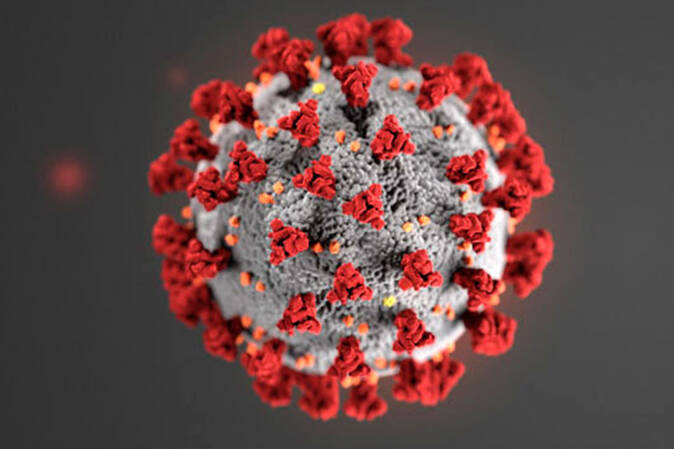State officials said monoclonal antibody COVID-19 treatments are under-stocked throughout Alaska, as many of the country’s shipments of the medication are on backorder.
Coleman Cutchins, a clinical pharmacist with the Department of Health and Social Services, said during a press briefing Thursday that the current COVID surge in Alaska is overwhelming the health care sector, as well as creating more of a demand for antibody infusions.
“Monoclonal antibodies were the first thing that we saw to really become very scarce in just a short period of time, (which is) really driven by a lot of large states with a lot of cases,” Cutchins said Thursday. “Last week, no one received any other shipments around the country. … Unfortunately, we’re running out of monoclonal antibodies.”
He said that some shipments on backorder started to arrive Thursday, but supplies are still limited.
The investigational medication, which is being provided free by the federal government, is approved by the Food and Drug Administration for emergency use authorization as a therapy for mild to moderate COVID-19.
According to the FDA in May the “safety and effectiveness of this investigational therapy continues to be evaluated.” Monoclonal antibodies, which create proteins that mimic the immune system’s ability to fight off viruses before they enter human cells, is not authorized for patients hospitalized or on oxygen therapy due to COVID.
Cutchins said that once people get vaccinated against the virus there will be less of a demand for monoclonal antibodies. The COVID-19 vaccines are meant to create antibodies before a person even becomes exposed to the virus.
The treatment shortage comes as the state announced 1,270 new COVID cases on Thursday, which closely aligns with the seven-day rolling case average of 1,209.7 cases. This is slightly down from the all-time high of the pandemic — a seven-day average of 1,269.7 on Sunday — but still nearly double the highest seven-day average reported during last winter’s surge.
Alaska remained at a high alert level Thursday. The threshold for high alert levels is 100 or more cases per 100,000 people. The state has surpassed that metric more than 10 times over.
Cutchins said Thursday that three weeks ago the federal government allocated monoclonal antibody treatments based on the number of cases and hospitalizations of each state, cross-referenced with the quantity of medication on hand.
Now, he said, since there’s a shortage, the allocation is different under guidelines from the National Institutes of Health.
“They’re… recommending that unvaccinated people who are at higher risk for severe disease or fully vaccinated people who are not expected to mount an adequate immune response should be given priority when receiving these drugs,” Cutchins said.
Officials with the DHSS said Thursday that although monoclonal antibodies have encouraging data for treating early-stage mild or moderate COVID, vaccines are the safest and most effective tool at Alaskans’ disposal for turning the tide on the pandemic.
“Prevention costs a whole lot less money,” Cutchins said.
To date, 60.3% of Alaskans 12 and older are fully vaccinated against COVID, and another 63.2% have received at least one dose.
The Kenai Peninsula lags behind the statewide average, with 50.2% of residents 12 and older fully vaccinated, and 52.6% with at least the first shot of their series.
As new cases and hospitalizations grow in Alaska, which still had the highest number of COVID cases per capita in the United States on Thursday, officials urge people to consider getting the vaccine now more than ever.
On Thursday, the state had one of the highest seven-day average COVID fatality rates in the country as the state reported 10 more deaths. Some of the deaths reported reflect backlogged data.
According to state data, 556 Alaskans have died due to COVID since the pandemic began.
Of the 10 reported Thursday, one was a Soldotna resident in his 40s.
Officials said with a dwindling supply of monoclonal antibodies — the only post-exposure COVID treatment proven effective at this time — vaccines will help keep Alaskans safe.
Cutchins emphasized that the more people get vaccinated the fewer monoclonal antibody treatments will be needed.
Testing locations
Officials encourage anyone with symptoms to test for COVID-19, despite vaccination status.
In Kenai, testing is available at the Chignik Lagoon Clinic, Odyssey Family Practice, Kenai Public Health Center and Capstone Clinic.
In Soldotna, testing is available at the Peninsula Community Health Center, Urgent Care of Soldotna, Walgreens and Soldotna Professional Pharmacy.
In Seward, testing is available at Providence Medical Center, Chugachmiut-North Star Health Clinic, Glacier Family Medicine, Seward Community Health Center and the Safeway pharmacy. Starting Sept. 14, the Seward Community Health Center is offering drive-thru testing Tuesdays and Thursdays from 1 p.m. to 2 p.m.
In Homer, testing is available at South Peninsula Hospital, or through other area health care providers at Seldovia Village Tribe Health and Wellness, Kachemak Medical Group and Homer Medical Center.
Reach reporter Camille Botello at camille.botello@peninsulaclarion.com.

